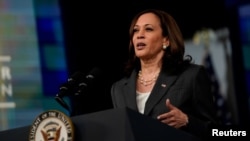U.S. Vice President Kamala Harris will next month travel to Singapore and Vietnam, “two critical Indo-Pacific partners,” the White House confirmed on Friday.
Vietnamese President Nguyen Xuan Phuc first announced the visit on Thursday, as he met in Hanoi with U.S. Secretary of Defense Lloyd Austin, the first Biden administration Cabinet official to visit Vietnam.
White House Senior Adviser and Chief Spokesperson Symone Sanders said in Friday’s statement Harris “will engage the leaders of both governments on issues of mutual interest, including regional security, the global response to the COVID-19 pandemic, climate change, and our joint efforts to promote a rules-based international order.”
“This upcoming visit continues that work – deepening our engagement in Southeast Asia,” said Sanders. The White House did not give specific dates for the trip.
It would be the first time an American vice president has visited Vietnam since north and south were reunited in July of 1975. Lyndon Johnson (1962) and Richard Nixon (1956) both visited Saigon during their respective vice-presidential terms, when it was the capital of South Vietnam.
Defense Secretary Austin’s traveled to Vietnam this week in the midst of the crippling COVID-19 pandemic and just days after the U.S. shipped 3 million doses of the Moderna COVID-19 vaccine to Vietnam. The delivery raises the total number of vaccines the U.S. has given the Southeast Asian nation to 5 million.
“We look forward to continuing to help in a number of ways … no strings attached,” Austin told Phuc. “It is what friends do to help friends in emergencies.”
Countering China
Austin also sought to deepen ties with Hanoi amid increased Chinese military activity in the South China Sea.
“It’s a part of the world where China continues to be very aggressive in the space, so it was important for the secretary to get here,” Pentagon press secretary John Kirby told reporters Thursday.
Hanoi has been increasingly vocal about its opposition to Beijing’s territorial claims in the South China Sea. Chinese vessels are accused of harassing oil and gas developers of Vietnam’s coast, hindering their energy development.
In the past, the U.S. has provided Vietnam with Coast Guard cutters to help bolster its ability to defend against Chinese aggression in waters claimed by both countries.
Despite China and Vietnam’s communist ties, Beijing has emerged as a new antagonist of Hanoi, while the U.S.-Vietnam relationship has flourished, according to Murray Hiebert of the Center for Strategic and International Studies.
“It’s amazing how far these two countries have come in the last 40 years or so. The U.S. is Vietnam’s biggest trading partner. It’s a major investor, and it has some of the closest military-to-military ties with any country in Southeast Asia,” Hiebert said.
Human rights concerns
However, members of the Biden administration have said Washington’s relationship with Hanoi will remain limited until Hanoi makes progress on human rights issues.
U.S. defense officials said Austin brought up the issue of human rights during his talks with Vietnam’s president, prime minister and minister of national defense
According to Kirby, the U.S. defense secretary said “that good friends and partners should be able to have open and honest discussions with one another about these difficult, fairly sensitive issues.”
Austin and his defense counterpart signed a memorandum of understanding Thursday that expands support to Vietnam’s efforts to locate and identify Vietnamese killed or missing during the Vietnam War.
A senior defense official told reporters the Vietnamese search will be aided by a database created by Harvard and Texas Tech University.
White House Correspondent Steve Herman contributed to this report.





